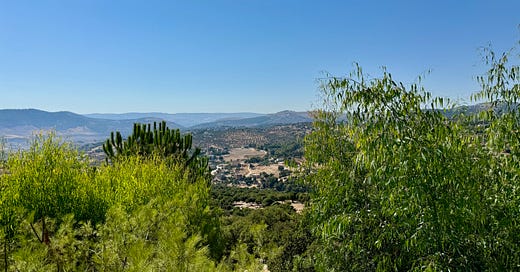Autumn in Amman
Jordan's elections, how I prep for purposeful travel, and banishing the toxic productivity monster
Hi friends,
It’s the end of fig season here in Jordan, signifying the passing of summer and the arrival of autumn. The olives are starting to ripen on the trees, waiting to be harvested and pressed into precious oil.
Temperatures are hovering in the low 80s. These warm afternoons feel stagnant, like a change is overdue. But this past Sunday morning, I stepped onto my porch and caught the slightest chill, just enough to warrant long sleeves. That means soon it will be cool enough for floating in the Dead Sea and for the rains to turn the hills emerald green, which makes me giddy with anticipation.
The changing seasons bring both internal and external shifts—I’m adjusting to working for myself, and I’m looking forward to deepening my understanding of the Balkans as I meander through Bulgaria, Slovenia, and Croatia, all of which are new to me (more on that below). Autumn also marks the start of a new session of Jordan’s parliament, and an interesting transformation in Jordanian politics.
ballot box blues
Parliamentary elections took place one week ago today. I appreciated having the opportunity to witness them, as they only happen every 4 years in Jordan. I feel that having an understanding of Jordanian politics is part of my duty as a guest here, especially given my host country is a close ally of the U.S., so I’ve tried to follow along. But Election Day in Amman was as quiet as any other, and you wouldn’t have known anything was happening if not for the campaign posters that decorated the streets for months prior (they bore images of candidates of all stripes, from men in their twenties to women in niqabs…plus a few joke posters that were photoshopped versions of famous actors, which I particularly enjoyed!). Despite recent reforms aimed at shifting away from a system based on tribal ties and toward one based on political parties, less than a third of Jordanians turned out to vote.
The allocation of parliament’s 138 seats is complex. Some are reserved for parties, some for regional districts, and a handful for minorities—Chechens, Circassians, Christians, and women. (Where that might be viewed as tokenism in the west, in this context, I see it as a good-faith effort to support pluralism; without such protections, the most powerful tribes could easily drown out minority voices…but it’s also worth mentioning that Jordan’s ethnic minorities tend to back the monarchy.)
Of the 41 seats reserved for political parties, the Islamic Action Front (IAF)—a party tied to the Muslim Brotherhood, whose platform includes support for Hamas and ending peaceful relations with Israel—won 31, making them the largest opposition party. That comes as no surprise. About half of Jordanians are of Palestinian origin, and they are fed up with a year of government inaction on the Israel-Hamas war.
Still, the IAF’s victory isn’t likely to revolutionize the political landscape. The rest of parliament remains in the hands of tribal factions and independent politicians who lean pro-government, and beyond that, the king of Jordan retains more power than most constitutional monarchs. The results are simply a reflection of the fact that public anger has become the water we swim in.
What piques your curiosity about politics (or life more generally) in Jordan? Please let me know in the comments!
how I curate reading lists for more purposeful travel
While (some) Jordanians have been busy at the polls, I’ve been getting excited to leave on my Balkans road trip. There will be brisk hikes to mountain lakes, sweater weather, and fall colors in abundance, and I’m looking forward to sending you exclusive postcards from the road in the coming weeks.
After hemming and hawing over how extensively to plan this journey, Nick and I decided to pre-book all our hotels. That provided some much-needed peace of mind, soothing my anxieties about showing up to an unfamiliar place without at least knowing we’ll have a roof over our heads. We are going to leave our days more open-ended, though, to give ourselves room to float from place to place, to stop for long lunches, and to sleep in when we feel like it.
With the logistics settled, I’m stepping into my favorite stage of trip prep: diving into good reads related to our destinations. And I don’t mean practical guide books. I mean writing that sparks my imagination and helps me feel connected to the place through listening to the stories it has to tell.






